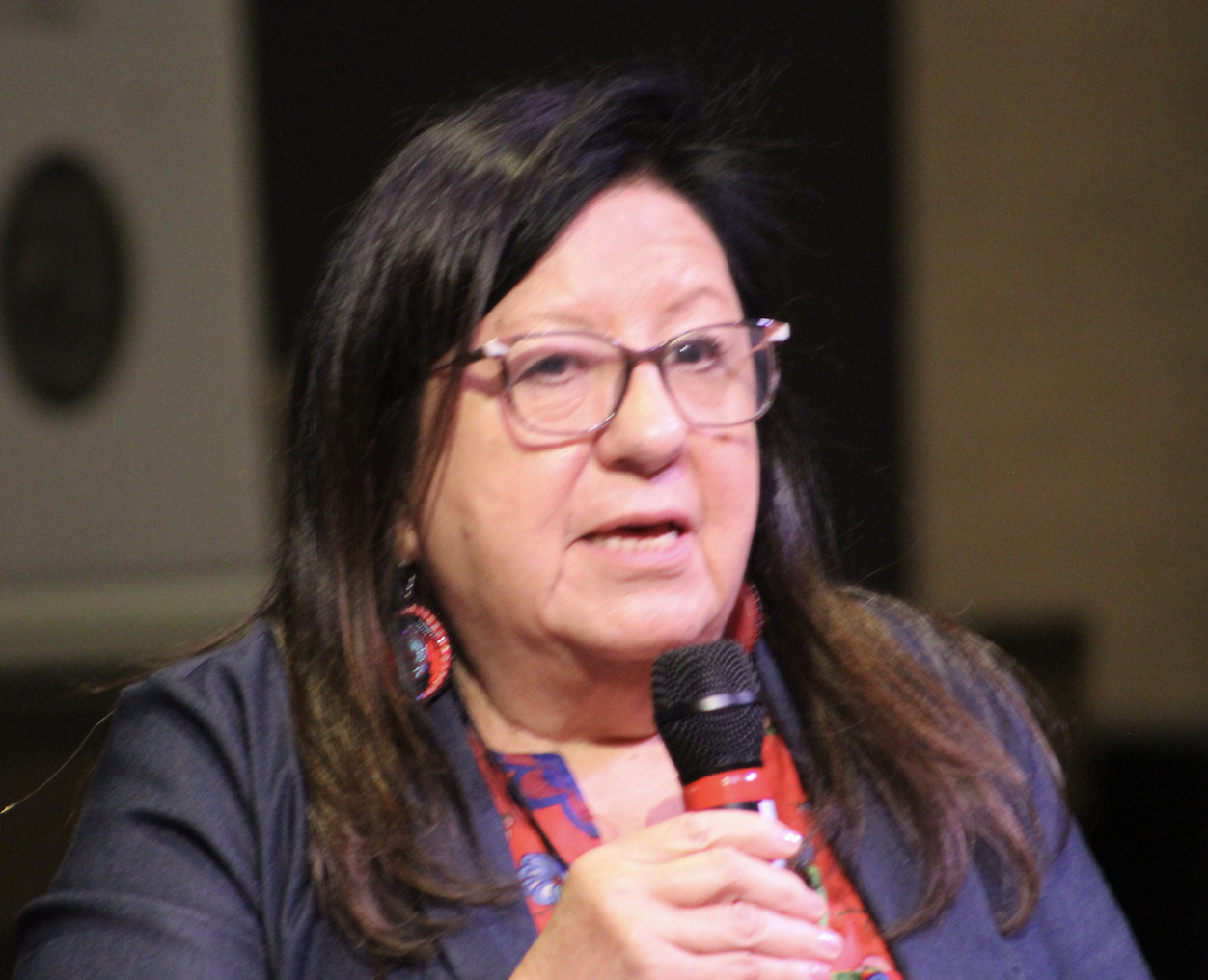
- Details
- By Levi Rickert and Neely Bardwell
NEW BUFFALO, Mich. — Native Vote 2024. Native News Online sat down with former Chairwoman Melanie Benjamin of the Mille Lacs Band of Ojibwe, who was part of a fireside chat at the Great Lakes Tribal Economic Summit last week in New Buffalo, Michigan, to discuss her views on the candidates running for president of the United states, and their running mates.
Melanie Benjamin was first elected to the four-year term of Chief Executive/Chairwoman of the Mille Lacs Band of Ojibwe in 2000, and was re-elected in 2004, 2008, 2012, 2016 and 2020. Benjamin previously served as the Band’s Commissioner of Administration and Sr. Vice President of Administration and Finance at Grand Casino Hinckley. As Chief Executive, Benjamin led the Executive Branch of the Band government and was responsible for conducting external relations with other governments.
Since the Mille Lacs Band is located in northern Minnesota, Benjamin is very familiar with Minneos Gov. Tim Walsh, the Democratic vice presidential nominee.
EDITOR'S NOTE: This transcript has been edited for brevity and clarity.
Tell us about your interactions with Minnesota Governor, Tim Walz, the Democratic Vice Presidential nominee?
I've had the privilege and honor of working with Governor Tim Walz for the last two terms, and what I really love about Governor Walz is his commitment to Indian Country, his commitment to government-to-government relationships, and his respect for tribal sovereignty. We have eleven tribes in the state of Minnesota, and we have a very good working relationship.
He just has all of the attributes and values that are important to Indian country: wisdom, love and compassion, bravery, integrity, he's humble. I think he is the best candidate for vice president. He will do wonders for this country, not only Indian country, but as a whole. He's a veteran. He is a coach. He was a teacher. These are the things I think every American wants to see in our candidates
Walz picked Peggy Flanagan (White Earth Ojibwe) to be Lieutenant Governor, what impacts has this had on Indian Country?
Picking Peggy Flanagan makes a perfect combination for a governor and lieutenant governor. They truly like each other. They work together. They share responsibilities for the state of Minnesota, and that is just outstanding. All of the tribes and tribal chairmen, we all have personal cell numbers we can call any time to reach them. He created a Native American division office in the Office of the Governor, so we have continuous direct contact for a lot of our issues.
When ICWA [Indian Child Welfare Act] was being threatened with the Brackeen v. Haaland case, Minnesota put in place protections right away because we wanted to protect our American Indian children. Those are the types of actions that he does.
We have a government to government consultation. All of the divisions of the state of Minnesota have a requirement that's law, and Governor Walz signed that into law, where they have to meet with the tribes on a yearly basis to learn about our initiatives and to educate themselves about the tribes and our responsibilities and our needs.
If Walz becomes the Vice President, how will that impact the government's relationship with Indian Country?
When Harris and Walz are elected, we will have a seat at the table, and that's very important. That's beautiful. Walz has such a strong and good working relationship with the tribes of Minnesota, and he can do that across the country. And we all know Harris has a good working relationship with tribes at this point, so I can see a lot more opportunities and good working relationships for our citizens. I look forward to that. I'm excited about it.
Help us defend tribal sovereignty.
At Native News Online, our mission is rooted in telling the stories that strengthen sovereignty and uplift Indigenous voices — not just at year’s end, but every single day.
Because of your generosity last year, we were able to keep our reporters on the ground in tribal communities, at national gatherings and in the halls of Congress — covering the issues that matter most to Indian Country: sovereignty, culture, education, health and economic opportunity.
That support sustained us through a tough year in 2025. Now, as we look to the year ahead, we need your help right now to ensure warrior journalism remains strong — reporting that defends tribal sovereignty, amplifies Native truth, and holds power accountable.
 The stakes couldn't be higher. Your support keeps Native voices heard, Native stories told and Native sovereignty defended.
The stakes couldn't be higher. Your support keeps Native voices heard, Native stories told and Native sovereignty defended.
Stand with Warrior Journalism today.
Levi Rickert (Potawatomi), Editor & Publisher
